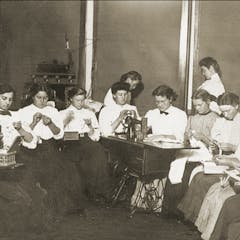
Articles on Elementary school
Displaying 21 - 40 of 41 articles

Inflation is soaring, but prices for typical back-to-school gear like backpacks, computers and new clothes are rising less than average – or even falling.

The core principle of education is to enable students to become kind, giving and contributing members of their community and the world.

Children who are bullied in school are at higher risk for depression and anxiety later in life.

In ABC’s ‘Abbott Elementary,’ Philadelphia schoolteachers go above and beyond for their students – just like real-life urban schoolteachers do every day, says one scholar.

Halfway through the school year that was supposed to be a return to normal, teachers are barely hanging on.

Problems include no fields, no courts for games, no playgrounds, no bike racks and no traffic-calming surrounding the school. Bringing in minimum standards is important.

Pediatric clinical trials for the COVID-19 Pfizer vaccine for children ages 5 to 11 have shown that the Pfizer shot is safe and effective.

Calls to reinstate home economics as a solution to modern woes reduce the field to a set of practical skills, undermining its breadth and complexity.

Female teachers perform better in the classroom and women principals lead to achieve better school management. But, female educators have to wait longer to be promoted.

How much homework kids should do is a subject of great debate.

US schools now collect detailed data on their students. But teachers and parents need to think carefully about how that data is used – and what it shows, or doesn’t show, about a student.

Tutoring is a billion-dollar industry. A former tutor explains what to look for in a tutor for your child and urges parents to consider free options before they open up their pocketbooks.

ClassDojo, the popular classroom behaviour management and communication system, is said to facilitate community and message-sharing. But who is asking how children are impacted?

While many parents believe equipping their young child with a cellphone is a matter of safety, research shows the practice comes with certain risks.

A systematic embrace of parents’ untapped knowledge by schools could revolutionize education systems in Canada and globally.

Schools across Canada should ‘grow down’ and offer two years of full-day preschool, according to a new report. This would allow mothers to work, improve child outcomes and reduce income inequality.

In the elementary classroom, improv can nurture a collaborative and creative climate in which even reticent kids want to participate.

Recent research raised concerns about girls’ stereotypes on their gender’s lack of ‘brilliance.’ But an overlooked finding suggests boys also hold hindering stereotypes about themselves in school.

Many schools claim that when students attend in uniforms, it improves discipline, and leads to academic gains. But does it?

Parent involvement with kids’ homework can have both positive and negative effects. So, what should parents and educators do?
